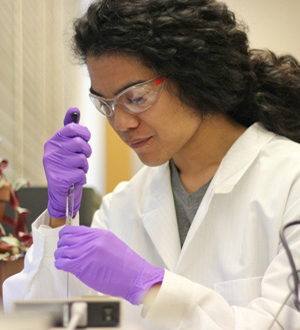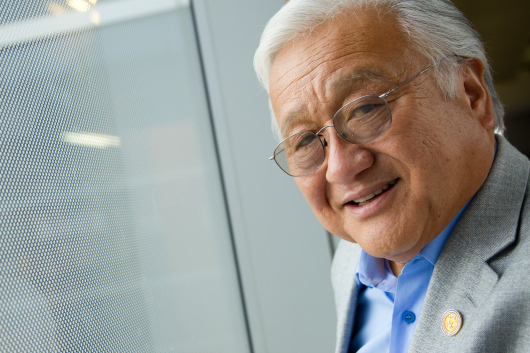Media contact: Pat Lopes Harris, 408-924-1748
Congressman Mike Honda will visit SJSU Sept. 5 to see first-hand how the federal sequester is hitting home for more than a dozen students seeking to reach their potential as biomedical and behavioral scientists.
“Our success rate will surely be impacted,” said Professor Leslee A. Parr, who also serves as program director for the SJSU Minority Access to Research Careers (MARC) program.
President Mohammad Qayoumi will join Honda as he meets students and faculty members and tours the labs where they collaborate on research, building the academic and hands-on skills students need to pursue graduate degrees.
“Investment in education at all levels has been the cornerstone of my efforts in Congress, and it is rewarding to see the work being done right here in Silicon Valley in the biomedical field,” Honda said. “Funding for programs like MARC at San Jose State University are under constant threat due to sequestration and other partisan battles in Washington, and as a senior member of the Appropriations Committee, I pledge to continue fighting to ensure that a quality education remains affordable and available to all.”
Honda will be treading on familiar ground. A Spartan with two degrees from SJSU, he received a bachelor’s in biological sciences and Spanish in 1968 and a master’s in education in 1974.
He went on to a 30-year career in education as a science teacher, school board member, principal and researcher at Stanford University.
Providing Access
The MARC program under the National Institutes for Health recently provided $252,000 to SJSU for the first year of a five-year grant. This represents a 54 percent cut from the amount awarded before the sequester.
The need is clear: African Americans, Hispanic Americans, Native Americans, Alaska Natives and U.S. Pacific Islanders combined make up less than 5 percent of the U.S. biomedical workforce.
“Increased diversity helps expand the range of research questions asked and the perspective of analysis and application and may help to decrease health disparities,” Parr said.
The results have been excellent:
- SJSU-MARC graduates have received 24 advanced degrees, including 12 PhDs and one MD/PhD.
- More than 40 SJSU-MARC graduates are currently in graduate and professional programs at institutions including UC Berkeley, UCSF, UC Santa Cruz, UC Irvine and Stanford.
- SJSU-MARC alumni are now professors at The Johns Hopkins University School of Medicine, the David Geffen School of Medicine at UCLA, The University of Texas Southwestern Medical School, Arizona State University and Hobart and William Smith Colleges.
But this year, when Congress resorted to a sequester to the balance the federal budget, MARC funding to SJSU was drastically reduced, forcing the university to drop five of the program’s 14 students.

Brian Castellano, ’13 chemistry, was a MARC program participant who received a fellowship for graduate school (photo by Christina Olivas).
Building Mentors
Even those who remain will sustain a 40 percent cut in tuition support, which means they’ll need to spend less time on preparing for graduate school and more time working to pay the bills, Parr said.
The sequester’s impact could go well beyond the students directly affected, given that many SJSU-MARC participants are driven by the prospect of one day mentor minority students following in their footsteps.
“That’s one of the reasons I am interested in science,” said Brian Castellano, an SJSU-MARC graduate who entered a doctoral program at UC Berkeley this fall. “There is an unlimited amount to learn and discover, and through mentoring, I am able to help others gain a similar passion.”


